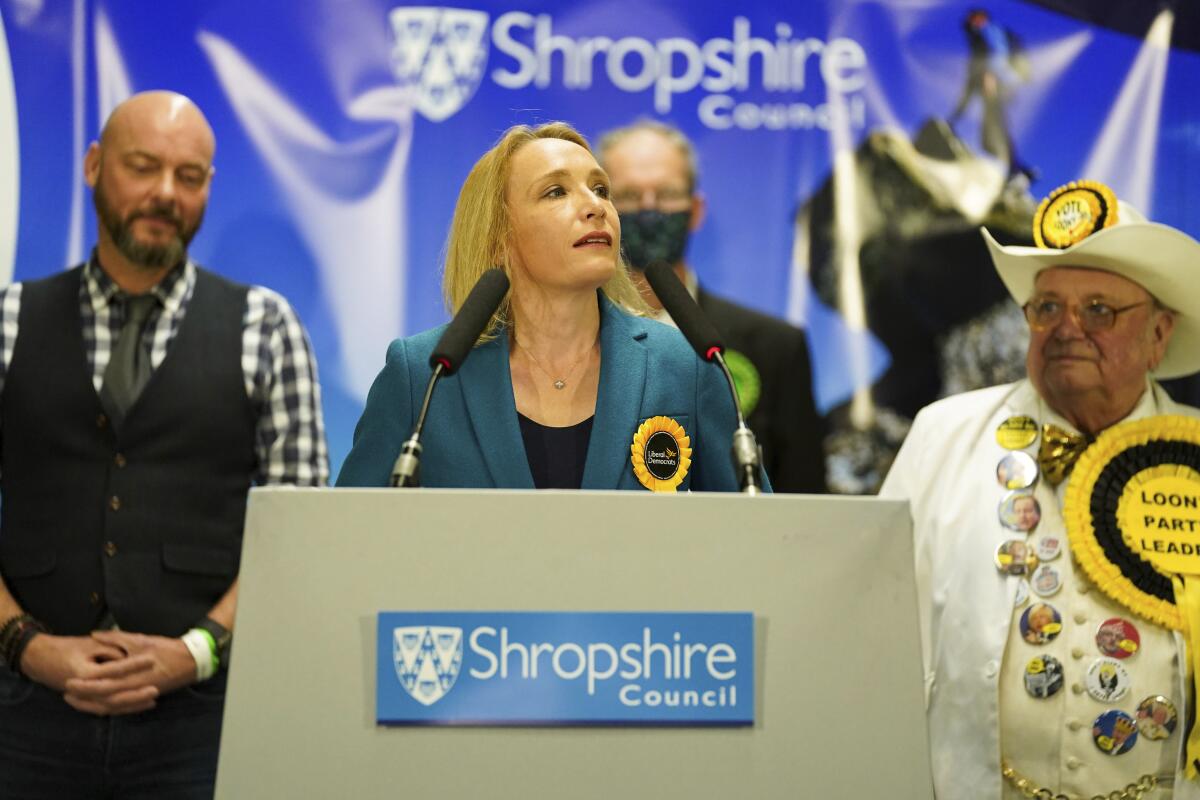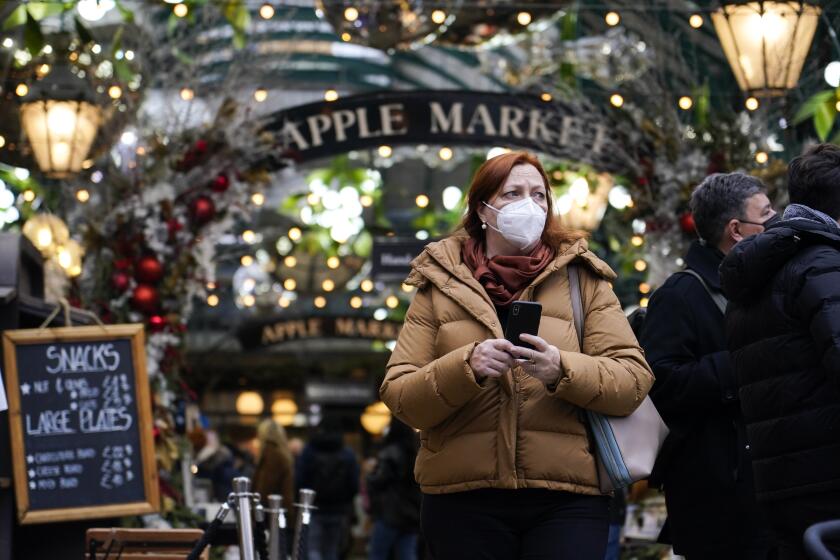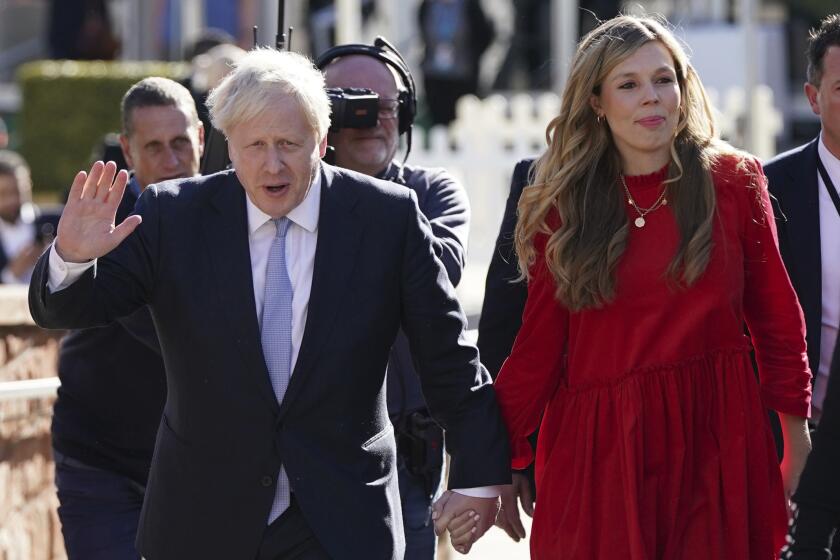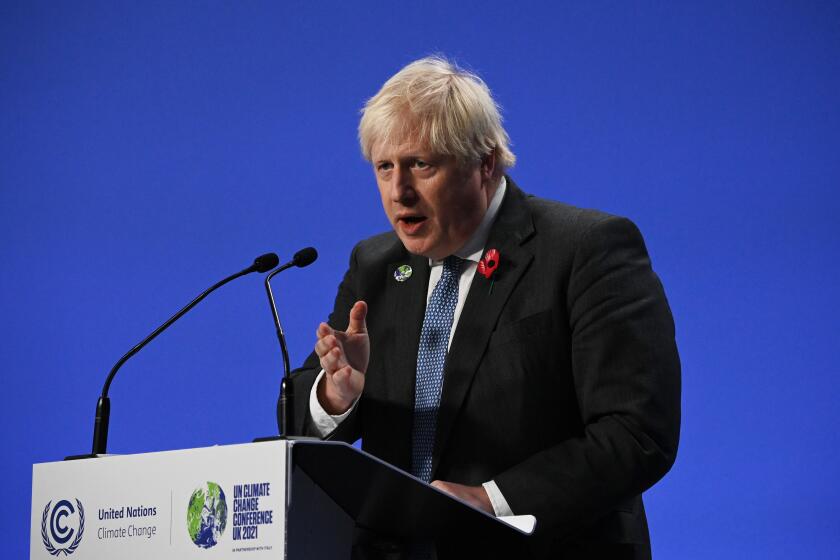Pressure mounts on U.K.’s Boris Johnson after his party suffers huge election defeat

LONDON — British Prime Minister Boris Johnson’s Conservative Party has suffered a stunning defeat in a parliamentary by-election seen by many a referendum on his government amid weeks of scandal and soaring coronavirus infections.
Liberal Democrat Helen Morgan overturned a Conservative majority of almost 23,000 votes from the last election, in December 2019, to win Thursday’s contest in North Shropshire, a rural area of northwest England that has been represented by a Conservative almost continuously since 1832. The by-election (similar to a special election in the U.S.) was called after the former Conservative member of Parliament resigned amid a corruption scandal.
The result will heap pressure on Johnson just two years after he was reelected with a seemingly unassailable 80-seat majority in Parliament. His authority has been dented in recent weeks by allegations that he and his staff attended Christmas parties last year while the country was in lockdown, efforts to shield an ally from allegations of illegal lobbying and suggestions that he improperly accepted donations to fund the lavish refurbishment of his official residence.
Both supporters and opponents are also questioning Johnson’s handling of the COVID-19 pandemic after coronavirus infections soared to record levels this week as the highly transmissible Omicron variant swept through Britain.
“Tonight the people of North Shropshire have spoken on behalf of the British people,” Morgan said in her victory speech. “They said loudly and clearly, ’Boris Johnson, the party is over. Your government, run on lies and bluster, will be held accountable. It will be scrutinized, it will be challenged and it can and will be defeated.’”
Thursday’s result is the second by-election defeat for the Conservatives this year. In June, the Liberal Democrat Sarah Green won a by-election in Chesham and Amersham, a constituency northwest of London that has also been a traditional Conservative stronghold.
Spiraling COVID infections in Britain driven in part by the new Omicron variant rattled many in Europe, fueling dread of another holiday scuttled.
John Curtice, a pollster and professor of politics at the University of Strathclyde in Scotland, said the defeat in North Shropshire was “pretty spectacular by historical standards,” noting that the party’s support plunged 34% from the previous election.
The only time the Conservatives, who are also known as the Tories, suffered a bigger drop during a by-election was in 1993, when the party was riven by internal division, he said. The Conservatives lost power to the Labor Party during the next general election in 1997. The U.K.’s next general election isn’t scheduled to take place until May 2, 2024.
Johnson took responsibility for the by-election defeat Friday. The government’s work in bolstering the National Health Service and rolling out COVID-19 booster shots had been obscured by headlines about “politics and politicians” that Johnson said have little to do with everyday life, in an allusion to the public scandals of recent weeks.
“I totally understand people’s frustrations,” Johnson said at a vaccination center in London. “In all humility, I have got to accept that verdict. I understand that what voters want us as the government to be doing at all times is to focus on them and their priorities.”
The office of British Prime Minister Boris Johnson says his wife, Carrie, has given birth to the couple’s second child, a baby girl.
Johnson became prime minister almost 2½ years ago, riding his support for Brexit and his carefully curated image as a sometimes-bumbling but likable politician.
He solidified his position by calling a snap election just five months later after Parliament rejected the withdrawal agreement he negotiated with the European Union. The Conservatives won 365 seats in the election, 80 more than all the other parties combined.
But Brexit is no longer the central issue in British politics.
Many voters are frustrated after two years of a pandemic that has claimed more than 145,000 lives, triggered a series of lockdowns and battered the economy.
As conference host, Britain’s Boris Johnson has brought his colorful but polarizing style to the U.N. climate change gathering in Glasgow, Scotland.
Conservative lawmakers rebelled against Johnson earlier this week, with 99 members of Parliament voting against his proposal to require proof of vaccination or a negative coronavirus test to enter nightclubs and large events. The measure passed only because the opposition Labor Party supported it.
Then there are the scandals and missteps that have made Johnson look more like someone who has lost control than his preferred persona of a slightly disheveled leader who’s so busy he can’t be bothered to comb his hair.
He was forced to apologize last month after trying to change parliamentary rules to avoid censure for Conservative lawmaker Owen Paterson, who had lobbied government agencies on behalf of companies he worked for. Paterson eventually resigned, triggering the by-election in North Shropshire.
Since then, Johnson has been buffeted by a series of news reports alleging that he and his staff attended Christmas parties last November and December at a time when COVID-19 restrictions barred everyone else from visiting friends or even comforting dying relatives in the hospital.
A parliamentary report slams British Prime Minister Boris Johnson’s government for ‘groupthink’ that prevented decisive action early in the pandemic.
Johnson initially stonewalled, saying that there were no parties and no rules had been broken. After a video surfaced in which staff members appeared to make light of the violations, Johnson was forced to call for an investigation.
Even some members of Johnson’s own party have now had enough.
Roger Gale, a Conservative lawmaker since 1983, said the result in North Shropshire was a clear indication that the public is dissatisfied with the way Johnson is running the government.
“I think this has to be seen as a referendum on the prime minister’s performance, and I think that the prime minister is now in ‘last orders’ time,” Gale told the BBC, using a phrase commonly heard at the end of the night in pubs. He has “two strikes already: one earlier this week in the vote in the [House of] Commons, now this. One more strike and he’s out.”
News Alerts
Get breaking news, investigations, analysis and more signature journalism from the Los Angeles Times in your inbox.
You may occasionally receive promotional content from the Los Angeles Times.
But Charles Walker, another Conservative member of Parliament, said the result was more about the anger and fatigue people are feeling after two years of the pandemic.
While he acknowledged that mistakes have been made, Walker stressed said it isn’t unusual for the governing party to suffer defeats in by-elections.
“Every time there’s a result like this, people say it’s seismic, people say it’s a shock wave, it’s a tsunami of change, and sometimes it is and sometimes it isn’t,” he told the BBC. “I don’t think we can read too much into this.”
More to Read
Sign up for Essential California
The most important California stories and recommendations in your inbox every morning.
You may occasionally receive promotional content from the Los Angeles Times.













